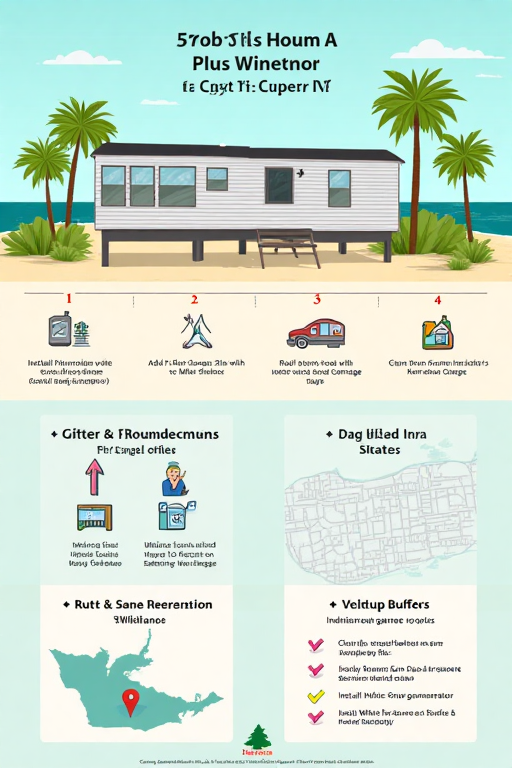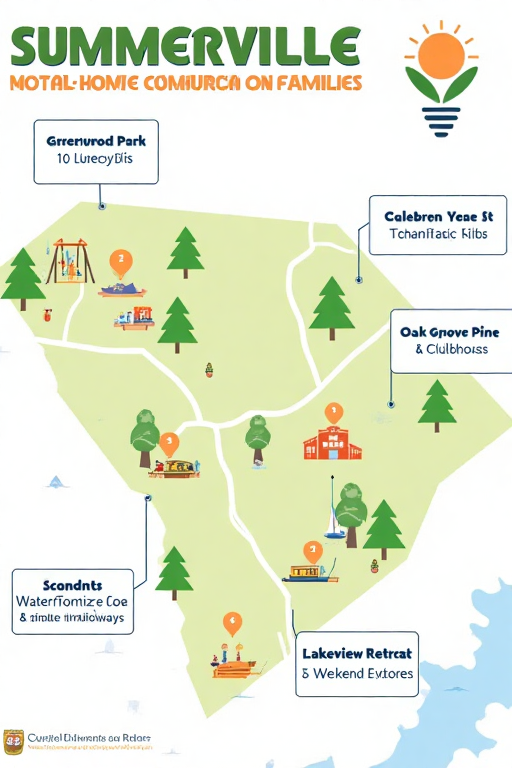How to Inspect a Mobile Home Before Buying in Sumter, SC
Your Essential Pre‑Purchase Inspection Checklist | Faith Mobile Home Solutions
Table of Contents
Introduction
Buying a mobile home in Sumter, SC can be a smart investment—but only if you know its true condition before writing a check. A thorough inspection uncovers hidden issues, helps negotiate repairs, and ensures safety and value. This guide walks you step by step through inspecting every critical aspect, from the foundation to the rooftop, so you can buy with confidence.
1. Preparing for Inspection
Before you start, assemble these tools and information:
- Inspection Checklist: Print or save this guide’s checklist.
- Flashlight & Moisture Meter: For dark areas and moisture detection.
- Camera or Smartphone: Document any defects.
- Seller’s Disclosures: Ask for maintenance, repair history, and permits.
- Personal Protective Gear: Gloves, sturdy shoes, and mask.
2. Exterior Inspection
Foundation & Skirting
Check for cracking, settling, or gaps in the piers. Ensure skirting panels are secure and vented properly.
Roof & Gutters
Look for rust or punctures in metal roofs and wear on shingle roofs. Verify gutters and downspouts are intact and drain away from foundation.
Siding & Paint
Inspect vinyl or metal siding for dents, rust, or loose panels. Peeling paint can signal moisture problems.
Windows & Doors
Open and close each window and door, checking seals, locks, and signs of rot or frame damage.
3. Interior Inspection
Floors & Ceilings
Walk every room to detect soft spots, uneven surfaces, or sagging ceilings. Look for water stains or mold growth.
Walls & Trim
Inspect wall panels for bowing or separation and check trim for gaps or damage.
Cabinets & Fixtures
Open and close all cabinets and drawers. Test faucets and check under sinks for leaks.
4. Plumbing System
- Water Pressure: Run faucets and shower to gauge pressure and temperature consistency.
- Drainage: Check all drains for slow flow or gurgling sounds.
- Pipes & Connections: Inspect under sinks and behind appliances for corrosion or leaks.
- Water Heater: Note age, capacity, and inspect for rust or leaks.
5. Electrical System
- Main Panel: Examine breaker labels, rust, and proper grounding.
- Outlets & Switches: Test each for power, heat, or flicker.
- Appliances: Power on stove, refrigerator, and HVAC to ensure safe operation.
- GFCI & AFCI: Verify Ground Fault and Arc Fault Circuit Interrupters work properly.
6. HVAC System
- Furnace & AC Unit: Run heating and cooling cycles; listen for unusual noises.
- Filters & Vents: Check cleanliness and airflow at each vent.
- Thermostat: Test accuracy and responsiveness.
7. Structural Components
- Tie‑Downs & Anchors: Ensure straps and anchors meet HUD wind‑resistance standards.
- Beams & Joists: Inspect beneath home for wood rot, sagging, or termite damage.
8. Moisture & Pest Check
Use a moisture meter around plumbing fixtures and the perimeter. Look for signs of rodents, termites, or ant infestations under skirting and in crawl spaces.
9. Documentation & Records
- Title & VIN/Serial Number: Verify ownership and match inspection records.
- Permits & Maintenance History: Review any building, electrical, or plumbing permits pulled.
- Previous Inspection Reports: Request copies to compare conditions over time.
10. Hiring a Professional Inspector
For an in‑depth assessment, hire a certified mobile home inspector. Expect to pay $300–$500 for a full report covering all systems and structural elements. Use the report to negotiate repairs or price adjustments.
11. Final Checklist & Next Steps
- Compile your notes and photos into a summary report.
- Discuss major issues with the seller and negotiate repairs or credits.
- Confirm all required permits for move‑in and installation.
- Schedule any needed repairs before closing.
Frequently Asked Questions (FAQs)
1. Do I need a professional inspection before buying?
Yes. A licensed mobile home inspector uncovers hidden defects and code violations, protecting your investment.
2. How much does a mobile home inspection cost in Sumter?
Typically between $300 and $500, depending on size and scope.
3. What’s the biggest issue found in used mobile homes?
Water damage around plumbing fixtures and roof leaks are the most common and costly problems.
4. Can I inspect the home myself?
You can perform a basic walkthrough, but only a professional inspector can identify code violations and structural defects.
5. How long does the inspection take?
Usually 2–4 hours, depending on the home’s size and complexity.
6. Are tie‑down inspections required?
Yes—HUD standards mandate tie‑down verification to ensure wind resistance.
7. What moisture level is acceptable?
Readings above 15% indicate potential water intrusion and warrant further investigation.
8. Should I inspect the crawl space?
Absolutely. The crawl space reveals foundation, beam, and pest issues beneath the home.
9. How do I check for mold?
Look for discoloration, musty smells, and test with a moisture meter. Professional sampling may be needed.
10. Can inspection findings void my purchase?
Your purchase contract may include an inspection contingency allowing walkaway or renegotiation.
11. Do I need an electrical permit?
Yes, to verify wiring and panel upgrades meet code.
12. How often should I re‑inspect mechanical systems?
Annually for HVAC and plumbing to catch wear before it becomes major.
13. What’s a common structural defect?
Rotting joists and termite damage under the home are frequent problems.
14. Is skirting inspection important?
Yes, proper skirting protects against pests, insulates the crawl space, and conceals utilities.
15. How do I test water quality?
Obtain a lab test for bacteria and minerals, especially if on a private well.
16. What if I find major defects?
Negotiate repairs, a price reduction, or contingency removal before finalizing the sale.
17. Should I inspect appliances?
Yes—run and observe each appliance for proper function and safety.
18. How to check roof integrity?
Look for rust, punctures in metal roofs, and curl or missing shingles on composite roofs.
19. Can I waive an inspection?
It’s strongly discouraged—waiving inspection exposes you to unforeseen costs.
20. What if the home fails inspection?
Use the inspector’s report to renegotiate or request repairs before closing.
21. Do tie‑down straps need re‑tightening?
Yes—check straps for corrosion and proper tension per HUD guidelines.
22. How to check for pests?
Inspect skirting vents, crawl space, and wood surfaces for droppings, tunnels, or nests.
23. Are permits transferable?
Permits typically expire; ensure new permits are pulled in your name if required.
24. Can I do repairs myself?
Minor repairs are fine, but major electrical or structural fixes require licensed professionals.
25. Where to find a certified inspector?
Check with the SC Manufactured Housing Board or local real estate associations for certified inspectors.
Additional Keywords
- mobile home inspection checklist Sumter
- pre-purchase mobile home inspection SC
- Sumter mobile home condition check
- how to inspect HUD home Sumter
- mobile home foundation inspection Sumter
- mobile home roof check SC
- Sumter manufactured home inspection
- HUD compliance inspection Sumter
- mobile home electrical check SC
- mobile home plumbing inspection Sumter
- Sumter mobile home moisture test
- mobile home pest inspection SC
- crawl space inspection mobile home
- skirting inspection Sumter
- mobile home tie-down inspection SC
- mobile home inspector near me Sumter
- licensed mobile home inspector SC
- mobile home inspection cost Sumter
- mobile home defect report SC
- Sumter mobile home safety check
- mobile home structural inspection SC
- hiring mobile home inspector Sumter
- inspection contingency mobile home
- mobile home walk-through checklist SC
- Faith Mobile Home Solutions inspection guide




